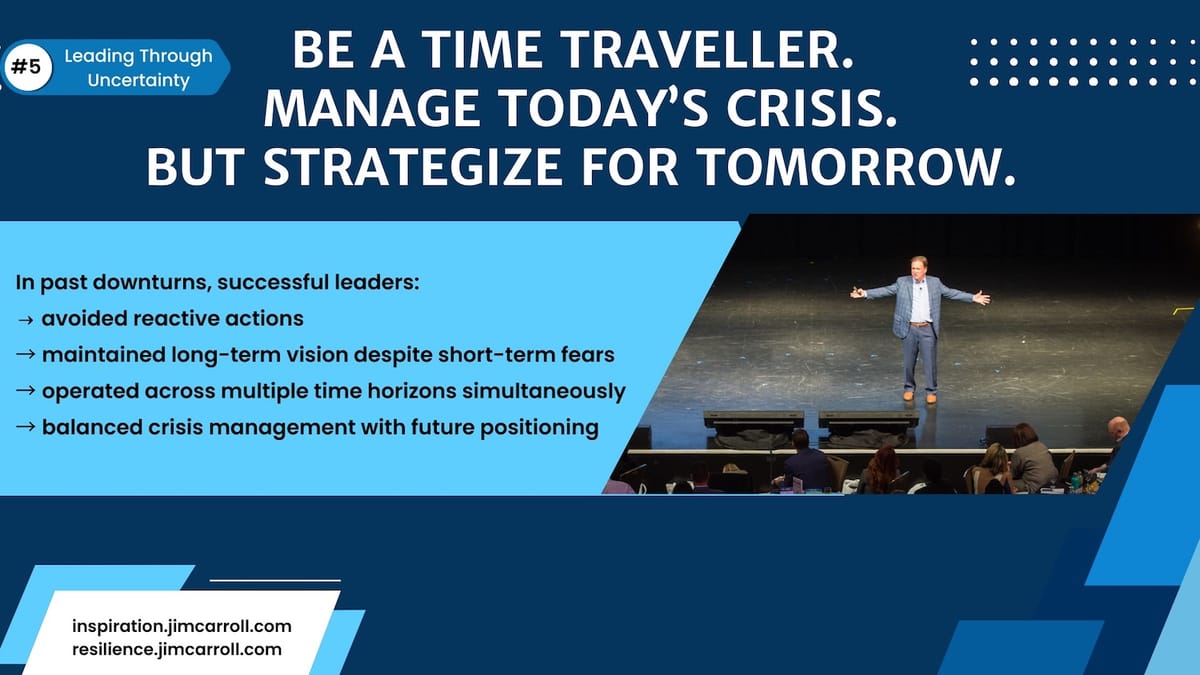Downturns are not just economic events.
They are stress tests for leadership.
When pressure builds, plans unravel. Priorities scatter. Noise takes over. People panic. That’s when some leaders retreat—shrinking their vision, delaying decisions, or hoping someone else will take the next step. But others stay grounded. They hold the line—for their teams, their strategy, and their purpose.
This is real resilience. Not slogans. Not survival But the ability to move across time—anchoring the present, while building for the future.
You have to be a time traveller: respond to the moment, while keeping your eyes locked on what comes next. Resilient leaders don’t just manage the current crisis —they hold it together until the future arrives.
Here’s what the data shows from past downturns:
- the most resilient organizations didn’t retreat into reactive cycles.
- they didn’t discard their long-term vision under short-term fear.
- they remained disciplined on costs and intentional on growth.
- they protected their people, their customers, and their momentum—not just their margins.
The fact is, while they managed the crisis in real time, they never lost sight of the bigger arc.
- they thought across multiple time horizons at once:
- they actively manage today.
- all while preparing for tomorrow.
- and positioning for the rebound that always comes.
They didn’t flinch. But they didn’t charge blindly either. They led with calm, communicated with transparency, and made decisions that reflected long-term confidence—not panic.
That’s the essence of future-ready leadership.
So as the pressure rises, the question is simple: Are you retreating—or reinforcing? Are you in one time zone or several?
Because the leaders who shape what’s next aren’t the ones with the boldest slogans. They’re the ones who stay clear, steady, and focused—while keeping one foot in the future.
Be a time traveller. Manage the crisis. But never stop building what’s next.
I continue to enhance my knowledge discovery tools. Lately, I've found that using the Kagi search engine (think Google without the crap) with Google Notebook (!) leads to some popwerful results. Wiht that, I dug into a search for some powerful quotes on recessionary thinking:
“Think of a recession as a sharp curve on race track – it’s the best place to pass competitors, but requiring more skill than on straightaway. he best drivers brake hard just ahead of the curve, turn hard toward the apex of the curve and accelerate hard out of the curve. Winning companies take out excess costs, identify the short list of projects that will form their next business model, and spend and hire before markets rebound.” - Bain & Company’s Accelerated Transformation business.
"The goal of strategy in a downturn is to help you end up on the right side of the mortality tables—not just surviving but poised for growth." - Bain Global Strategy Practice
"Well-prepared companies emerged as winners during and after past recessions. These companies managed a strong defense and offense in parallel, reining in costs while simultaneously reinvesting in growth." - also Bain
"True leadership isn’t tested when things are going well—it’s forged under the pressure of uncertainty. The best leaders don’t get lost in endless what-ifs; they focus on the present, solving today’s problems while keeping the long game in mind." - Brian Melka, president and CEO of energy solutions company Rehlko
"Our role is not to try and predict what’s going to happen, but it’s to anchor our teams firmly in our purpose and our strategy." - Ole Rosgaard, president and CEO of packaging company Greif
"In every era of radical change, some companies end up stronger, more agile and better positioned than before.You don’t need to beat the overall economy to win. You only need to beat your rivals." - Dan Bigman
"Absorb fear, exude hope. And be ready for opportunity." - Greg Brenneman, who turned around Continental Airlines.
"Waiting for the weather to improve before setting sail is wasting valuable time. Today's leaders must think like seasoned captains in a storm: stay calm, read the currents, adjust course and keep moving forward. It is not about predicting the future, but about being prepared to navigate it." - Ernst Young
Futurist Jim Carroll is sharing his insight on resilience and leadership in this series. You can find the full archive, as it unfolds, at https://tomorrow.jimcarroll.com

